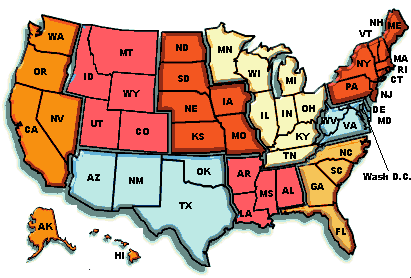

| |
| Click on a state | |
|---|---|
The Developmental Disabilities Research Centers are a national resource. Established by Congress in 1963 as "centers of excellence" for research in mental retardation and developmental disabilities, they represent our nation's first sustained effort to prevent and treat disabilities through biomedical and behavioral research. Today, they are the world's largest concentration of scientific expertise in the fields of intellectual and developmental disabilities. They form a network that fosters communication, innovation, and excellence in research.
University Affiliated Programs (UAPs)
Established by President Kennedy's Panel on Mental Retardation to help States and local communities respond to the needs of people with developmental disabilities and their families, UAPs serve as a liaison between the academic world and the developmental disabilities service delivery system. UAPs network with and provide assistance to State Agencies, their local affiliates, and to various nongovernmental consumer-based organizations.
AAUAP is the central office for the 61 University Affiliated Programs (UAPs) and is their representative to the federal government. UAPS are located at major universities and teaching hospitals in all states. These multi-disciplinary centers support the independence, productivity, integration, and inclusion into the community of individuals with developmental disabilities
and their families. Services provided by UAPs vary according to state; but in general, each one provides direct multi-disciplinary diagnostic and service programs, conducts research, and provides practical training. They may be able to provide the names of practitioners in your area knowledgeable and comfortable working with children with Down syndrome and their families.
UAPs have been renamed University Centers for Excellence in Developmental Disabilities Education, Research, and Service (UCEDDERS), commonly referred to as UCEs.
The Association of University Centers on Disabilities (formerly the American Association of University Affiliated Programs for Persons with Developmental Disabilities) promotes and supports the national network of university centers on disabilities, which also includes Leadership Education in Neurodevelopmental and Related Disabilities (LEND) Programs and Developmental Disabilities Research Centers (DDRC).
Association of University Centers on Disabilities (formerly American Association of University Affiliated Programs (AAUAP))
8630 Fenton Street, Suite 410Developmental Disabilities University Affiliated Programs
Silver Spring, MD 20910
(301) 588-8252
Fax: (301) 588-2842
TDD: (301) 588-3319
Executive Director: George Jesien, Ph.D.
Administration on Developmental Disabilities
Administration for Children and Families
Department of Health and Human Services
Washington, DC 20201
(202) 690-5911
Contact: Gail Evans
| Source: | |
| 1. Medical & Surgical Care for Children with Down Syndrome. A Guide for Parents. Van Dyke, D. C., Mattheis, P., Eberly, S. S. & Williams, J. (Eds.) 1995, Woodbine House. p. 379-84. | Revised: January 15, 2006. |